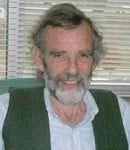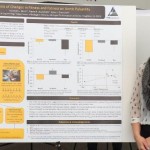
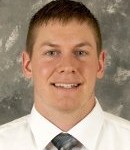 From Tech Today
From Tech Today
The Ecosystem Science Center congratulates all 36 students who submitted posters to the competition held last week. The posters will continue to be on display in the atrium of the Noblet building through April 8.
Of the eight undergraduate poster submissions, Graceanna Schilz (Advisor: Molly Cavaleri SFRES) won the grand prize with the poster entitled “Effects of Seedling Warming in Tropical Forests.” Gina Testa (Advisors: Jessie Knowlton and David Flaspohler, SFRES) won a merit award with the poster “Avian Community Responses to Stand Age in Northern Aspen Forests.”
For the 28 graduate poster entries, Kelsey Carter won the grand prize for the poster “Plant Physiological Thermal Thresholds of Saplings in a Puerto Rican Tropical Rainforest,” (Advisor: Molly Cavaleri, SFRES). Three merit winners were: Cameron Goble (Advisor: Nancy Auer, Bio. Sci.) with the poster “Fish-Habitat Associations in Tributaries to the Manistee River, Michigan: Implications for Arctic Grayling Restoration,” Colin Phifer (Advisors: David Flaspohler and Chris Webster, SFRES) for the poster “Bird Community Responses to Afforested Eucalyptus Plantations in Argentina,” and Ryan van Goethem (Advisor: Amy Marcarelli, Bio. Sci.) for the poster “Legacy Disturbance Effects in a Lake Littoral Zone: Effects of Stamp Sands on the Structure of Macrophyte Communities in the Keweenaw Waterway of Michigan.”
Congratulations to the winners and thank you again to the many judges involved.
UPDATED: Link to the official news release in Tech Today.
Excerpted from an email from Lorelle Meadows, Dean Pavlis Honors College congratulating the winners of the Undergraduate Research Expo:
“During the Expo, all of the posters were judged by a minimum of 2 faculty judges. The researchers receiving the highest average scores are:
1st Place Gina Testa, Wildlife Ecology and Management
“Avian Community Responses to Stand Age in Northern Aspen Forests”
2nd Place Hannah Marti, Biomedical Engineering (who worked in Dr. John Durocher‘s laboratory)
“The Effects of Changes in Fitness and Fatness on Aortic Pulsatility”
3rd Place Olivia Ingram, Biological Sciences ( who worked in Dr. Kevin Trewartha‘s lab in Cognitive Learning Sciences)
“The Role of Implicit Memory Processes in Age-Related Declines in Motor Learning”
Congratulations! These students will all receive a small token, a $20 gift card to dining services, lunch with the Vice President for Research and an invitation to receive their certificate at the Annual Student Leadership Awards Reception.
Expo visitors also voted on an audience choice award and we have a remarkable three-way tie. The winners of this award are: Olivia Ingram, Lewis Marshall and Abbey Senczyszyn. Winners of the audience choice award may stop our office beginning tomorrow to retrieve your audience choice prize.”


Edited from Tech Today:
Two graduate students in the Department of Biological Sciences received poster presentation awards at the Midwest Aquatic Plant Management Society conference Tuesday, 8 March, in Grand Rapids.
Carmen Leguizamon (advised by Casey Huckins) received a second place award. Ryan Van Goethem (advised by Amy Marcarelli) received a third place award. 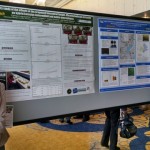
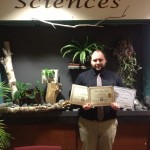 Graduate student, Travis Wakeham was recently honored with numerous awards by the Graduate Student Government , including:
Graduate student, Travis Wakeham was recently honored with numerous awards by the Graduate Student Government , including:
Outstanding Teaching Award for his involvement and development of our Anatomy and Physiology laboratories working closely with Dr. John Durocher and Brigitte Morin.
Best oral presentation at the recent Graduate Student Colloquium that includes an award of $300.
Best attended oral presentation at the Colloquium that includes an award of $50.
In addition, his picture was featured on the TV website reporting on the Colloquium.
Travis is a Masters student working in the lab of Dr. John Durocher and conducted much of the research for his presentation in the lab of collaborating colleague Dr. Stephen Elmer in the Department of Kinesiology and Integrative Physiology.
 From Tech Today:
From Tech Today:
Thomas Werner (Bio Sci/LSTI) is the principal investigator on a project that was awarded a $363,359 research and development grand from the U.S. Department of Health and Human Services-Nation Institutes of Health. The project is “The Role of Toolkit Gene in Generating Complex Color Pattern in Drosophila.” This is a three-year project.
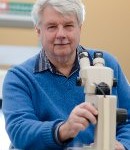 Dr. Kerfoot was one of many Michigan Technological University faculty and staff to present at the recent Torch Lake Watershed Project Public Meeting
Dr. Kerfoot was one of many Michigan Technological University faculty and staff to present at the recent Torch Lake Watershed Project Public Meeting
An account of the meeting can be found in the 9 February 2016 blog post from Keweenaw Now
LAKE LINDEN —
What do you know about the Torch Lake Watershed, the Torch Lake Superfund and stamp sand, the Torch Lake Area of Concern, PCBs and fish advisories, ongoing research and remediation of contaminated sites in the area? The Torch Lake Watershed Project public meeting is one way to learn about these issues and to become involved in a community effort to plan the future of this area.
http://keweenawnow.blogspot.com/2016/02/torch-lake-watershed-project-public.html
 Xiaoqing Tang (Bio Sci), was one of the authors of the paper, “Essential RNA-Based Technologies and Their Applications in Plant Functional Genomics,” in the Journal Trends in Biotechnology by the Cell publishers. [From Tech Today]
Xiaoqing Tang (Bio Sci), was one of the authors of the paper, “Essential RNA-Based Technologies and Their Applications in Plant Functional Genomics,” in the Journal Trends in Biotechnology by the Cell publishers. [From Tech Today]
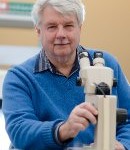 Charles Kerfoot (Bio Sci) with Susan C. Savage was published in “Limnology and Oceanography“.
Charles Kerfoot (Bio Sci) with Susan C. Savage was published in “Limnology and Oceanography“.
The article covers experiments done on anti-predation defenses in a group of cladoceran taxa over 20 years, both in the New World and Old (Max Planck Center for Limniology, Ploen, Germany). The article emphasizes the importance of evolution in aquatic food webs, and begins to explain why exotic predators may have disproportionate effects on naive prey species. [From Tech Today]
A PhD position is available with Dr. Amy Marcarelli at Michigan Technological University to join a 5-year, NSF-funded study of the balance between nitrogen fixation and denitrification in streams and rivers across the United States.
Candidates with an M.S. in aquatic ecology or related discipline are preferred.
Interested applicants should contact Dr. Marcarelli (ammarcar@mtu.edu) immediately for full consideration. More information on the Marcarelli lab can be found at http://marcarelli-lab.bio.mtu.edu/.
